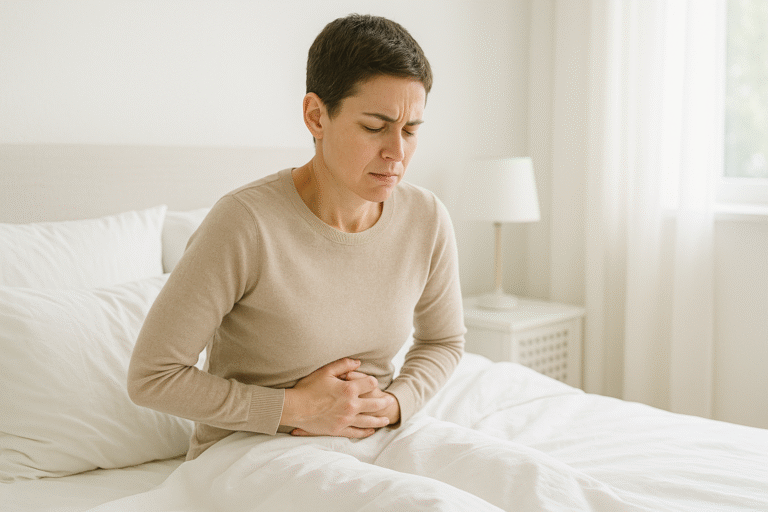Natural remedies for Crohn’s disease can sit alongside your prescribed care and make daily life a little easier. Crohn’s can be unpredictable, one minute you are fine, the next you are scoping out the nearest loo, second‑guessing lunch, and running on empty. The good news, small, sensible changes can ease symptoms and give you back pockets of control.
Below you will find 10 practical ideas on how to manage Crohn’s symptoms naturally. They are realistic, low faff, and designed to work with your medical plan, not against it.
Understanding Crohn’s Disease Basics
Crohn’s disease is a type of inflammatory bowel disease that can affect any part of the digestive tract. Inflammation can lead to diarrhoea, abdominal pain, fatigue, and weight loss. Symptoms can settle, then flare again.
Common causes
- Genetics. A family history can increase risk.
- Autoimmune activity. The immune system may overreact and inflame the gut lining.
- Environment. Infections, stress, smoking, and certain foods can trigger symptoms.
Typical symptoms
- Ongoing diarrhoea and abdominal pain.
- Fatigue, low appetite, and unintended weight loss.
- Flare-ups followed by periods of calmer symptoms.
Many people use natural ways to manage Crohn’s symptoms alongside medicines. Think of these as a thermostat, small adjustments that can steady the temperature of daily life, rather than a light switch.
Why Try Natural Approaches
Medication remains the backbone of Crohn’s care. Still, symptoms do not always fit neatly into a prescription. Gentle diet changes, stress management, movement, and sleep habits can reduce irritation in the gut and support recovery between flares. They also give you practical levers to pull on difficult days.
Natural remedies for Crohn’s disease
These ideas focus on food, hydration, gut health, and daily routines. Pick one or two to start. Small wins add up.
10 Effective Natural Ways To Handle Crohn’s Disease Symptoms
1. Eat an anti-inflammatory diet
Food can influence inflammation and comfort. An anti-inflammatory diet for Crohn’s disease aims to be gentle on the gut while keeping nutrition steady.
Foods that may help
- Omega-3 fatty acids from salmon, sardines, or flax.
- Cooked leafy greens such as spinach and kale.
- Turmeric. Curcumin is the active compound often studied for inflammation.
- Berries and other colourful fruit for antioxidants.
Foods some people limit
- Very greasy or fried foods.
- Highly processed foods with additives.
- Refined sugars and sugary drinks.
During a flare, lower fibre and smaller, more frequent meals can feel easier. In calmer phases, add soluble fibre and whole foods gradually. A dietitian can tailor this to you.
2. Drink plenty of water
Diarrhoea increases fluid and electrolyte losses. Simple hydration tips for Crohn’s disease can reduce fatigue, headaches, and cramping.
- Sip water through the day. Use a bottle you actually like.
- Try oral rehydration solutions after frequent stools.
- Add lemon or mint if plain water bores you.
- Limit alcohol and excess caffeine if they irritate your gut.
3. Use mindfulness to ease stress
The gut and brain are in constant conversation. Light, regular mindfulness techniques for Crohn’s disease can calm that chat.
- Five slow breaths before meals to relax the digestive tract.
- Ten minutes of guided meditation or a body scan.
- Journalling to park worries and track patterns.
4. Move your body regularly
Movement supports mood, sleep, and gut motility. Choose low-impact activities that feel doable on an average day.
- Brisk walking, even in short bursts.
- Yoga or gentle stretching for core strength and relaxation.
- Cycling or swimming for joint-friendly cardio.
Think consistency over intensity. These are practical lifestyle changes for Crohn’s disease, not a boot camp.
5. Consider herbal remedies and supplements
Some people explore home remedies for Crohn’s disease such as supplements that support gut health. Always speak to your IBD team first.
- Probiotics. May help with gut bacteria balance in some cases.
- Curcumin and turmeric. Often researched for inflammation.
- Omega-3 fatty acids. From fish oil or diet.
- Digestive enzymes. Sometimes used when certain foods feel heavy.
This is a natural treatment for Crohn’s disease category where personal response varies. Professional advice matters.
6. Prioritise good quality sleep
Sleep supports immune function and recovery. Poor sleep can raise stress and pain sensitivity.
- Keep a steady sleep and wake time.
- Dim screens an hour before bed.
- Try a wind-down routine, warm shower, light reading, or calming tea.
7. Spot and avoid food triggers
Triggers differ widely. A short food and symptom diary can reveal patterns you might miss in the moment.
- Note meals, snacks, drinks, and timings.
- Record symptoms, stress, sleep, and activity.
- Review weekly to see likely culprits.
Work with a dietitian if you try an elimination plan. The aim is fewer symptoms with enough nutrition, not a shrinking menu.
8. Stop smoking
Smoking is linked with worse Crohn’s outcomes. Quitting can reduce flare frequency over time and support overall gut health.
9. Get safe sunlight for vitamin D
Many people with IBD have low vitamin D. Safe time outdoors or a supplement discussed with your clinician can help maintain levels.
10. Build a support network
Share the load. Friends, family, peer groups, and patient forums can lower stress and provide practical tips that textbooks miss.
What helps a Crohn’s flare-up at home
- Hydrate with water or oral rehydration drinks.
- Lean on simple foods like rice, banana, yoghurt, and soup if tolerated.
- Use heat packs for cramping and rest when you can.
- Keep any agreed rescue plan handy and contact your IBD team if symptoms change.
Bringing it together
You do not need to overhaul your life. Try one or two options from these natural ways to manage Crohn’s symptoms, see what fits, then build from there. If it makes your day 10 percent easier, that is a win worth keeping.
Medical disclaimer
Remember: This blog post is intended for informational purposes only and should not be construed as medical advice. Always consult with your doctor to discuss your individual situation and determine the best course of treatment for you. Do not start or stop medications without speaking to a doctor. Do not change your diet without speaking to your doctor or a healthcare professional.





